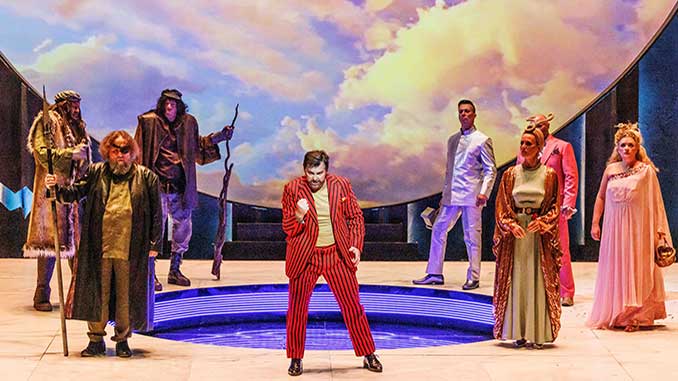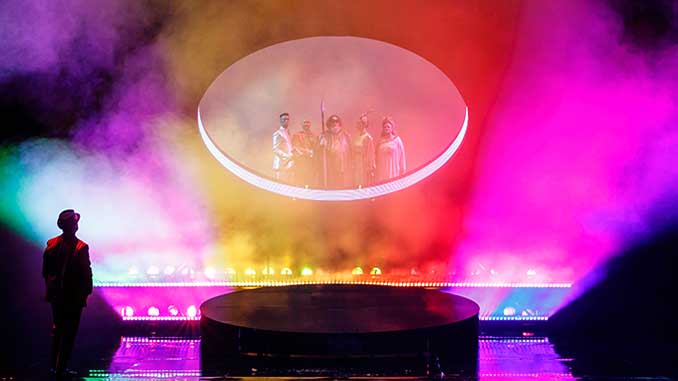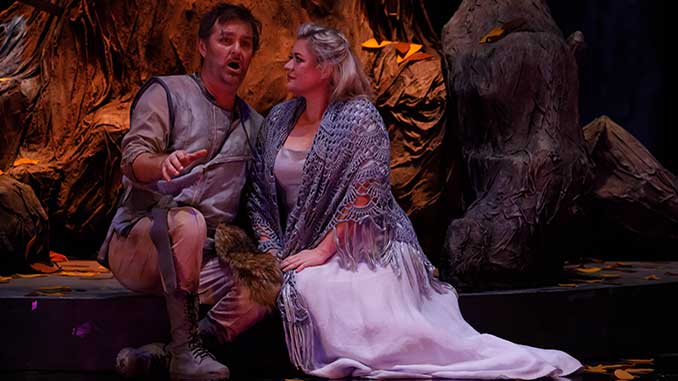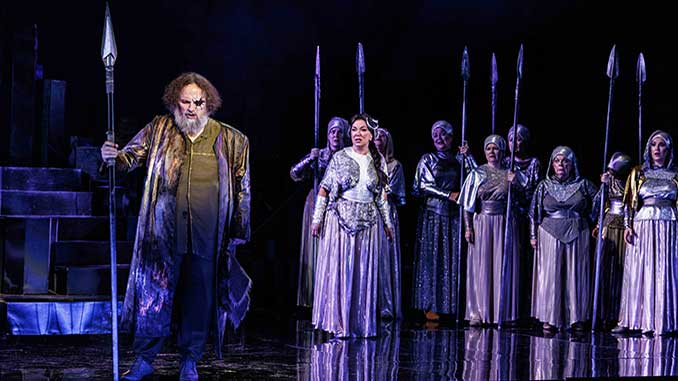 Nothing, it appears, is going to quash Melbourne Opera’s determined spirit. Yet another pinnacle is being scaled – leaving to an opera-loving public’s imagination what more could be possible if state and federal government funding went to where it deserves to go.
Nothing, it appears, is going to quash Melbourne Opera’s determined spirit. Yet another pinnacle is being scaled – leaving to an opera-loving public’s imagination what more could be possible if state and federal government funding went to where it deserves to go.
It is almost 7 years since the company made the bold leap into Richard Wagner’s Bayreuth canon – a body of work consisting of 10 operas by the German composer that have been performed at the Bayreuth Festival, which he founded, since 1876.
It began with Tannhäuser in 2016. Lohengrin followed in 2017, Tristan and Isolde in 2018 and The Flying Dutchman in 2019. So, in 2020, when the company announced a season of Das Rheingold – Wagner’s first instalment of his four-part epic Der Ring des Nibelungen – it became rather clear, and wildly ambitious, that an entire Ring Cycle might be embarked upon.
In a radiant production directed by Suzanne Chaundy, Das Rheingold opened in 2021, by which time a Melbourne Opera Ring was being mapped. A dramatically accomplished Die Walküre opened in February 2022 and, keeping the bellows pumping, Siegfried followed in a concert performance in September. That left both it and the final work, Götterdämmerung, to evolve and wait in the wings.
Now, a coming of age has truly been reached in this, the company’s 21st year with Wagner’s sprawling and punishingly demanding Ring of more than 15 hours of music and theatre getting underway on Friday evening.
Where? Perhaps no one saw Bendigo coming. Just over a two hour drive from their home in Melbourne, a tiny sense of the Bayreuth pilgrimage, however, comes to mind arriving at the historic regional city’s Ulumbara Theatre.
Bayreuth and Bendigo – one could make other frivolous comparisons but what Melbourne Opera’s Bendigo Ring is not, is a conceptually divergent interpretation characteristic of Bayreuth’s nowadays de rigeur regietheater.
Bayreuth’s current Ring by Austrian director Valentin Schwarz unfolds like a modern dynastic drama revolving around the story’s complex genealogical framework in a television mini series kind of way. A wonderfully inventive springboard, Schwarz, however, throws around an unrelenting concoction of ideas that eventually drag the saga tiresomely along.
Nevertheless, keeping an open mind ought to be a natural part of one’s passion for opera on the creative stage. And part of the enigma of The Ring is the life given to it in so many of its artistic transformations.
 Like Berlin’s much loved, more than 30-year spanning and now retired Deutsche Oper Ring directed by Götz Friedrich and played out through a tunnel evoking a torus, or donut ring, and the more recent Metropolitan Opera Ring utilising a grinding levered machine throughout and directed by Robert Lepage, Chaundy’s concept rests upon an environment that squarely supports clear, character-focused storytelling. But Chaundy digs further at the roots.
Like Berlin’s much loved, more than 30-year spanning and now retired Deutsche Oper Ring directed by Götz Friedrich and played out through a tunnel evoking a torus, or donut ring, and the more recent Metropolitan Opera Ring utilising a grinding levered machine throughout and directed by Robert Lepage, Chaundy’s concept rests upon an environment that squarely supports clear, character-focused storytelling. But Chaundy digs further at the roots.
That it is accomplished with eye-catching minimalism and aesthetic strength is a credit to her surrounding creatives – Andrew Bailey’s inspired and thoughtfully scaled sets, Harriet Oxley’s relatable, character-distinctive costumes and Rob Sowinski’s moodily painted award winning lighting combine in stage pictures of meaningful, often piercing beauty.
A giant stage-width drawbridge with a great circular cut-out demarcating worlds above, below and viewed from – and likely including worlds in between when the epic continues next weekend with Siegfried and Götterdämmerung – makes an impressive and memorable mark. Through every scene change as it is gently manoeuvred into place it makes a believable space-creating device to serve the story’s various spheres of life.
Wagner’s fantastical world of gods, demigods, giants, dwarfs, nymphs and mortals, vying for survival in a universe decaying from corruptive forces and conflicts between love and greed is timeless in its scope. Chaundy identifies those aspects marvellously.
And when so many of The Ring’s defining “accessories” such as the forged ring itself, the tarnhelm, Nothung the sword and the ash tree are often reinterpreted or only alluded to, conservative audiences are rewarded with a production in which a spade is a spade.
The work’s embedded generational shifts present a complex expanse to navigate but Chaundy provides Das Rheingold and Die Walküre, with a deep understanding of the characters and insight into the task of storytelling.
Das Rheingold, The Ring’s “preliminary evening” provides a macro view of events that drive the main dramas of the cycle, brought about by the renunciation of love and precipitated by the theft of the Rheinmaidens’ gold by Alberich who forges a ring and whose wearer commands great power.
Die Walküre subsequently zooms in with an examination of love and its relationship to the unstable link between questions of law and morality. Curiously, and part of The Ring’s mystique, the thematic depths can feel as equally unreachable as they do close to the human heart.
As librettist and composer, Wagner’s immediately immersive and leitmotif-filled music is the key to unlocking its themes as part of one’s own personal encounter with it.
Making that musically enriching journey, British maestro and Wagner specialist Anthony Negus is a prized asset in casting the spell.
Nevertheless, it was a tough ship to steer from the pit on opening night with more than 90 musicians obviously sensing the enormity of the occasion when Das Rheingold‘s signature 136-bar, primal awakening began.
Further along, nerves were particularly distracting and widespread in the brass quarters, orchestral balances tipped from time to time but, overall, Negus’ demands for dramatic depth and buoyant momentum shone through.
It the was not the sound picture the Melbourne Opera Orchestra had already proven they were capable of. That was put in the past and turned around magnificently on Sunday for Die Walküre, when, start-to-finish, a seamlessly absorbing and confident music emanated from these heroes – impressive given they are not a full time orchestra.
 Remarkably, and even more impressive, Chaundy has an all-Australian cast at hand, casting any doubt aside that the country doesn’t have the breadth of talent required for this operatic Everest.
Remarkably, and even more impressive, Chaundy has an all-Australian cast at hand, casting any doubt aside that the country doesn’t have the breadth of talent required for this operatic Everest.
Internationally renowned Ring-producing companies could learn much from a cast who completely understand their own and every role around them and whose synergetic respect is palpable. They are indeed shaping up as a dream team.
Focused and assured in voice, Simon Meadows epitomised and celebrated his role as a slimy, creepy and dark-world Alberich. Meadows reprises his role from 2020 and the couple of years have added a further intensity to his performance.
Endowed with requisite stamina and convincing tone and heft, Warwick Fyfe brought a wealth of character and feeling to his commanding Wotan, ruler of the gods. Fyfe gave a solid physical performance including the sometimes less-is-more angle, culminating in an incomparable moment of silent, defeated introspection before the flames surrounding Brünnhilde.
Sarah Sweeting’s statuesque and glamorously sung and frocked Fricka made a compelling transformation from suspecting yet wishful wife in Das Rheingold to bitterly wounded, enlightened and coercive influencer in Die Walküre.
James Egglestone must surely be revelling in a career high after nailing two worlds-apart roles not usually sung by the same person in the same cycle. First, an agile Egglestone illuminated the stage as the trickster Loge – pairing brilliantly with Meadows’ Alberich in a particularly informative show of their outcast states. But the notch went higher. As a youthful, searching Siegmund, Egglestone’s warm-toned and vocal sincerity leapt into the soul.
Egglestone has lashings of talent to support his performance, with Lee Abrahmsen rendering a profoundly affecting portrayal of an emancipated Sieglinde – Siegmund’s newly found twin sister and subsequent love – and placing her performance in a league of greats.
Together, they entwined hearts and voice, eliciting sublime belief and sympathy in their “immoral” pursuit and bringing one to challenge ideas about rules of love.
By comparison, Abrahmsen’s initial appearance as the abducted Freia in Das Rheingold, as urgently and fully sung as it was in this supporting role, could easily have been handed over to one of any of the many worthy available.
Brief but impactful, the arrival of earth goddess Erda was delivered with excellent shadowy foreboding by Deborah Humble in a dignified saunter across the stage.
Expertly-prepared and in fine voice, Robert Macfarlane animated the crafty and repressed Mime with ample jittery behaviour and Darren Jeffrey and Steven Gallop as the giants Fasolt and Fafner were physically towering and appropriately thundering in voice.
From the moment Antoinette Halloran stepped out, her Brünnhilde felt gloriously ready, willing and likeable – and that was despite her initial gung-ho Ho jo to ho! greeting feeling less meatier than the lines can achieve.
Between acting on Wotan’s altered will to carry Siegmund to Valhalla and that of her own when she is faced with pure and steadfast love, Halloran builds Brünnhilde with a masterpiece of emotionally evolving character through to the devastating climax when father and daughter make their final farewell.
 There are so many highlights of unforgettable drama where motivations and actions are challenged and souls are laid bare. Every bit of Die Walküre is a riveting tension-building drama that swells from crescendo to crescendo and where, more than any of the 8 other Ring cycles I have seen, tears frequently formed. I wasn’t alone.
There are so many highlights of unforgettable drama where motivations and actions are challenged and souls are laid bare. Every bit of Die Walküre is a riveting tension-building drama that swells from crescendo to crescendo and where, more than any of the 8 other Ring cycles I have seen, tears frequently formed. I wasn’t alone.
Those sitting close to the stage might feel the magic of the experience lost, as I did, for the opening of Das Rheingold, which was otherwise a dreamily experienced encounter when sitting further back two years ago.
But, looking at the big picture, looking at this incredibly exciting experience and looking forward to next weekend, one seat is as valuable as the next. Not every time does the realisation of a work impart the work’s true intentions. And not always does the author realise the potential of their work.
What seemed clear, however, as the first weekend concluded, is that this Melbourne Opera Ring is beginning to feel like coming close to reflecting the work’s intentions and, quite possibly, exceeding Wagner’s dreams. You are being urged to make that pilgrimage to Bendigo.
Bendigo Ring Cycle: Das Rheingold | Die Walkure
Ulumbarra Theatre, Gaol Road, Bendigo
Performances: Das Rheingold – Friday 24 March | Die Walkure – Sunday 26 March
Season continues to 30 April 2023
Information and Bookings: www.melbourneopera.com
Images: Das Rheingold | Das Rheingold | Die Walkure | Die Walkure – all photos by Robin Halls
Review: Paul Selar
